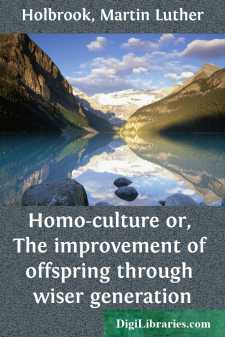Categories
- Antiques & Collectibles 13
- Architecture 36
- Art 48
- Bibles 22
- Biography & Autobiography 813
- Body, Mind & Spirit 142
- Business & Economics 28
- Children's Books 17
- Children's Fiction 14
- Computers 4
- Cooking 94
- Crafts & Hobbies 4
- Drama 346
- Education 46
- Family & Relationships 57
- Fiction 11829
- Games 19
- Gardening 17
- Health & Fitness 34
- History 1377
- House & Home 1
- Humor 147
- Juvenile Fiction 1873
- Juvenile Nonfiction 202
- Language Arts & Disciplines 88
- Law 16
- Literary Collections 686
- Literary Criticism 179
- Mathematics 13
- Medical 41
- Music 40
- Nature 179
- Non-Classifiable 1768
- Performing Arts 7
- Periodicals 1453
- Philosophy 64
- Photography 2
- Poetry 896
- Political Science 203
- Psychology 42
- Reference 154
- Religion 513
- Science 126
- Self-Help 84
- Social Science 81
- Sports & Recreation 34
- Study Aids 3
- Technology & Engineering 59
- Transportation 23
- Travel 463
- True Crime 29
Homo-culture or, The improvement of offspring through wiser generation
Description:
Excerpt
STIRPICULTURE.
Natural selection, which is the central doctrine of Darwinism, has been explained as the "survival of the fittest." On this process has depended the progress observable throughout organic nature to which the term evolution is applied; for, although there has been from time to time degradation, that is, a retrogression, this has had relation only to particular forms, organic life as a whole evidencing progress towards perfection. When man appeared as the culmination of evolution under terrestrial conditions, natural selection would seem almost to have finished its work, which was taken up, however, by man himself, who was able by "artificial" selection to secure results similar to those which Nature had attained. This is true especially in relation to animals, the domestication of which has always been practiced by man, even while in a state of nature. Domestication is primarily a psychical process, but it is attended with physical changes consequent on confinement and variation in food and habits. This alone would hardly account, however, for the great number of varieties among animals that have been long domesticated, and it is probable that actual "stirpiculture" has been practiced from very early times. This term is derived from the Latin stirpis, a stock or race, and cultus, culture or cultivation, and it means, therefore, the cultivation of a stock or race, although it has come to be used in the sense of the "breeding of offspring," and particularly of human offspring. It is evident, however, that in relation to man this is too restricted a sense, and it must be extended so as to embrace as well the rearing and training as the breeding of children, in fact, cultivation in its widest sense, in which is always implied the idea of improvement.
Stirpiculture in this extended sense was not unknown to the ancients, both in theory and in practice. As to the former, the most noted example is that of Plato, who, in his "Republic," proposed certain arrangements as to marriage and the bringing up of children which he thought would improve the race, and hence be beneficial to the State. The State was to Plato all in all, and he considered that it should form one great family. This idea could not be carried into effect, however, so long as independent families existed, and therefore those arrangements had for one of their chief aims the abolition of what we regard as family life. This Plato thought was the best for the State, and the advantage which was supposed to accrue to it by the absence of separate families is expressed in a marginal note, which says: "There will be no private interests among them, and therefore no lawsuits or trials for assault or violence to elders."
Plato's Restrictions on Parentage.—The end would hardly seem to justify the means, in these days, at least, when violence to elders is an uncommon incident; but how was the community of wives and children by which it was sought to be attained to be brought about? It is said, "The best of either sex should be united with the best as often, and the inferior with the inferior as seldom, as possible." Thus the people were to be classified into "best" and "inferior," and while the former were to be brought together as often as possible, the latter were not to be united at all if it could be avoided....


